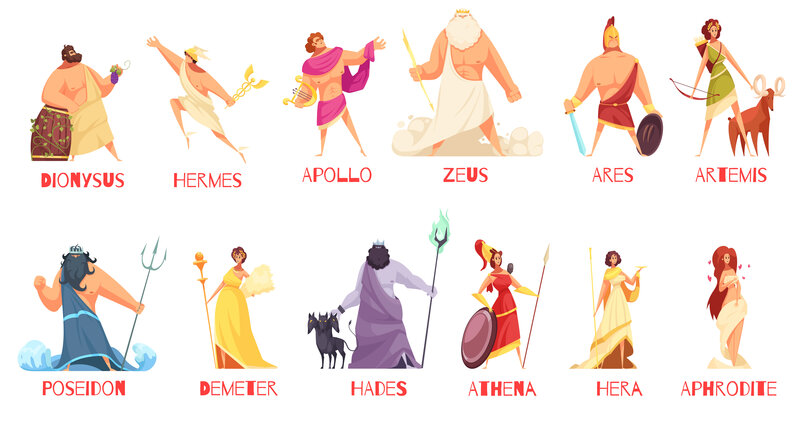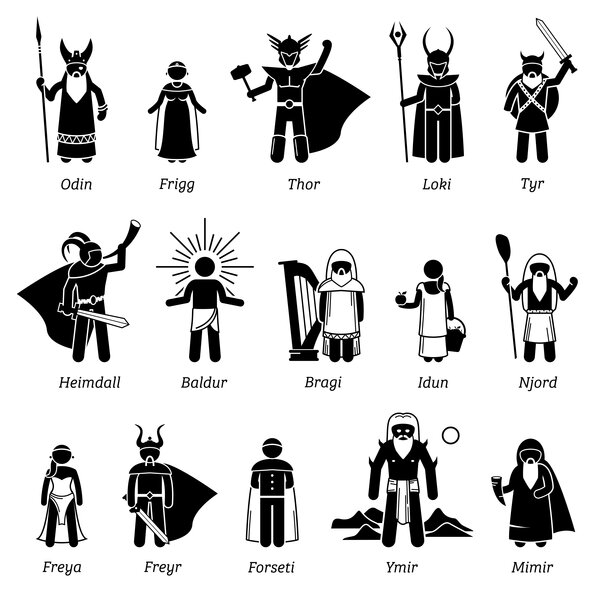Greek gods are immortal, while Norse gods are not. Greek gods can influence or change fate, but Norse gods can't. Also, the Norse gods are closer to humankind than the Greek ones.
What Are the Differences Between Greek Gods and Norse Gods?
1. Immortality
Greek gods are immortal, whereas Norse gods are mortal.
The Norse gods have supernatural abilities. However, in the end, they have to face their own mortality. This practice reflects the troubles and difficulties the ancient and modern people of Scandinavia faced, especially during the Viking age.
Most Norse gods died during Ragnarök, where there was an ultimate battle between chaos and order. Most of the gods who died during this battle are revered ones of the Norse deities.
Among those who died include:
- Thor – slayed the world serpent Jörmungandr but later died from its venom.
- Odin – He was swallowed by the mighty wolf Fenrir.
- Heimdall – He was locked in a battle with Loki, the trickster god, and they later slayed each other.
2. Influence on Fate
Greek gods can influence or change fate, but Norse gods can’t. They have a predestined future that they can’t change.
Odin suffered the death of his son helplessly, and the Æsir and Vanir also foretold the death of nearly all Norse god pantheons.
3. Take on the End of the World
There is no apocalypse in Greek mythology, but Norse mythology has Ragnarok.
As told by the Prose Edda, Ragnarök is a prophecy foretold to Odin concerning the sad ending of the god’s life. Besides, it prophesized the sudden ending of the world, over which the gods would have no control.
4. Where they live
Greek gods live at the top of mountains; mount Olympus at the top with Hephaestus. Others, like Hades, live in the underworld.
On the other hand, Norse gods live in the following environments:
The Æsir gods live in Asgard; the Vanir gods live in Vanaheim.
5. Interactions With Mankind
Norse mythology is more close to humankind than Greek gods. Also, Norse gods can get hurt, are hungry, and can even die.
| Difference | Norse Mythology Gods | Greek Mythology Gods |
| Immortality | Mortal | Immortal |
| Influence on fate | Cannot influence fate | Can influence fate |
| Take on the end of the world | The world will end (Ragnarok) | No apocalypse |
| Location | Asgard & Vanaheim (realms) | Mount Olympus |
| Interactions with mankind | Close to mankind | Little to no interaction with mankind |
What Are the Similarities Between Greek Gods and Norse Gods?
1. Both Are Polytheistic
Greek and Norse mythology have many gods, with their believers believing in more than one god.
2. They Both Have Flaws
Neither the Greek gods nor Norse gods are perfect.
For instance, in Norse mythology, Odin had to give up one eye to become the god of wisdom from the well of knowledge. He also used trickery to steal the poetry mead.
On the other side, Zeus is ill-tempered, easily provoked, and likes violence. In addition, he also involves himself in petty disputes.
What Is Norse Mythology?
Norse mythology is an organized set of beliefs that is part of the ancient indigenous religion practiced by Northern Germanic tribes.
It was shared by people speaking similar languages and united by the same religion. This religion was predominant in the Viking Age (c. 790- c. 1100 CE) before Christianity emerged and prevailed in the Middle Ages.
Its believers used Norse mythology stories to organize better and understand the world. The main characters of this belief system were gods, deities, and living things.
The religion talks about the creation myth of the first god and the world’s destruction in Ragnarök.
The All-Father Odin is the sole ruler of this polytheistic pantheon, but there are several other gods and goddesses.
This mythology is passed on from generation to generation through poetry, as there are no reference scriptures.
What Is Greek Mythology?
Greek mythology is a set of beliefs and stories about ancient Greek gods, goddesses, fools, heroes, legends, and monsters.
These myths had so much fiction recognized by critical greeks like Plato in the 5th–4th century BCE, e. g. the legends of greedy King Midas.
However, a large part of this myth is seen as a true representation of Greek culture and religion. A good example is the Trojan War epic. Consequently, it has significantly influenced Roman arts and contributed to the western civilization of Greece culture.
Greek mythology also explained religious rituals and weather. Besides, it explained the universe and its contents.
Norse Gods & Greek Gods and Their Realms
1. Greek Gods
Greek mythology has twelve prominent Olympians, as shown below.
| God/Goddess | Realm |
| Zeus | the king of all the gods, god of law, weather, and fate |
| Aphrodite (Venus) | goddess of love and beauty |
| Hera | goddess of women and marriage and queen of the gods |
| Dionysus | god of pleasure, wine, and festivity |
| Apollo | god of prophecy, knowledge, poetry, and music |
| Athena | goddess of wisdom and defense |
| Demeter | goddess of agriculture and grain |
| Ares | god of war |
| Artemis | goddess of animals, hunting, and childbirth |
| Poseidon | god of the sea |
| Hephaestus | god of sculpture, fire, and metalworking |
| Hermes | god of hospitality, travel, and trade |

2. Norse Gods
Norse mythology has fifteen main gods, as shown below.
| God/Goddess | Realm |
| Odin | king of the Æsir gods |
| Ymir | ancestor of giants |
| Frigg | Æsir gods’ queen |
| Thor | loyal defender of Asgard |
| Loki | Trickster god |
| Tyr | god of war |
| Baldr | god of light and purity |
| Vidar | silent god of vengeance |
| Freyja | goddess of fate and destiny |
| Heimdall | vigilant guardian of Asgard |
| Bragi | ‘bard’ god of Asgard |
| Hel | ruler of the underworld |
| Idun | youthful goddess of rejuvenation |
| Njord | god of seas and wealth |
| Freyr | god of fertility |

Are Greek Gods Older Than Norse Gods?
Yes, Greek gods are older than Norse gods.
The people practicing the Norse religion began worshipping Thor and Odin much later after Greek gods were already popular.
Are Norse Gods Stronger Than Greek Gods?
No, Norse gods are not stronger than Greek gods.
The only Norse gods considered stronger are the royal family members of Asgard or Vanir. They include Freyja, Baldur, and Týr.
However, Odin, the king of the Æsir, and Thor, his son, are the only ones considered as strong as Zeus.

